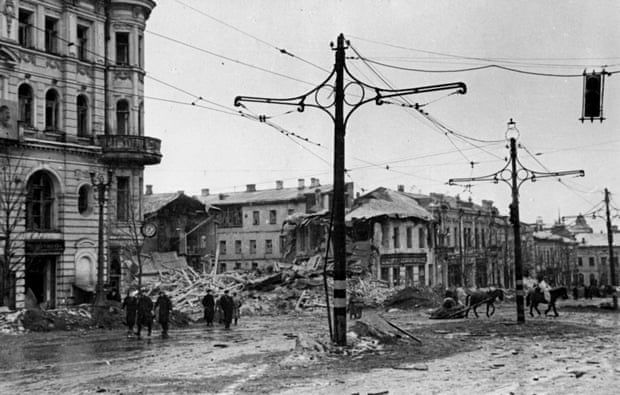
Each day, President Zelenskiy reads my book on military history. I hope he heeds these warnings
The Ukrainian president Volodymyr Zelenskiy’s speech to parliament on Wednesday was filled with references to the second world war and Winston Churchill. Just as evil was defeated before, he said, so evil will be defeated today. Comparisons with that momentous conflict have been a common theme throughout Russia’s invasion of Ukraine – but at least we can rest assured that Zelenskiy knows what he’s talking about.
I was flattered when the Economist reported a few weeks ago that Zelenskiy gets up early each morning and reads from my book, Hitler and Stalin: The Tyrants and the Second World War, recently published in Ukrainian translation. I was also impressed that, while trying to win a bloody war against the Russians, he found time to read anything other than official documents.
The only other statesman I could think of who had turned to a history book in a similar situation was John F Kennedy, who was hugely influenced by Barbara Tuchman’s The Guns of August at the time of the Cuban missile crisis. Having read Tuchman’s book, which argued that miscommunications led to the first world war, JFK redoubled his efforts to reach a peaceful solution with Nikita Khrushchev.
My book, alas, can’t play a similar role in the current Ukrainian conflict – not least because during the Cuban missile crisis both sides were open to a deal. But, nonetheless, there are still useful things Zelenskiy can learn from the story of Hitler and Stalin during the second world war.
What surprised me when I started listing the potential parallels was that, consciously or unconsciously, Zelenskiy has already learned much of what this history has to offer, whereas Vladimir Putin has demonstrably not. This is all the more extraordinary because Putin fancies himself as something of an expert on the war.
There are three broad areas of this history that are especially relevant to the conflict in Ukraine. These aren’t lessons that can be applied precisely to the present situation. History doesn’t work like that – the past never repeats itself exactly. But I do think that history can offer us warnings.
 Kharkiv in February 1943 after being liberated by Soviet troops.
Kharkiv in February 1943 after being liberated by Soviet troops. Early in the morning of 12 May 1942, the Red Army advanced towards the enemy. But the swiftness of its advance was to be its undoing, as the German army closed behind them, in a classic manoeuvre of entrapment. More than 250,000 Red Army soldiers were lost as a result of the disastrous Kharkov operation. It was a defeat that was all the more humiliating because the Red Army had outnumbered the Germans on the battlefield. But it hadn’t mattered; Stalin’s inept leadership had doomed them to defeat.
Putin, a year ago, was similarly overconfident when the Russians invaded Ukraine. Tens of thousands of his soldiers died, and are still dying, because of his military incompetence. In contrast, from the very beginning of this conflict, Zelenskiy has left the military decisions to his generals.
It wasn’t until the autumn of 1942 that Stalin started listening to his best military leaders – in particular Zhukov. If he hadn’t changed, and stopped thinking that he was a better military thinker than the professionals, the whole course of the war might have been different.
The next warning is this: overpromising in war can have catastrophic consequences. In September 1942, Adolf Hitler made a speech in which he “assured” the German people that “no one can take us away” from Stalingrad. But within months the Red Army had encircled and destroyed the German sixth army, and liberated the city. The loss of Stalingrad was not just a decisive military defeat for the Wehrmacht, but a turning point in the Germans’ perception of their leader. Hitler had promised that the city would not fall. He had lied. So how could they trust him next time?
Putin is in a similar position. He keeps reassuring the Russian population that the Ukrainians are about to be crushed. But does anyone now believe him? Zelenskiy has taken the opposite approach. If anything, he downplays Ukrainian successes and sets no specific timetable for military action.
The final warning is simple: make sure you are clear just what constitutes victory. Hitler failed to do this. He never said how much territory his army had to conquer in the Soviet Union before “victory” was won. The result was that German soldiers were always unsure what goal they had to achieve in order to bring the war to an end.
Putin is just as vague about what victory looks like for the Russian army in the current conflict. Is it simply holding on to the territory they’ve seized so far? Is it overthrowing the current Ukrainian regime? Who can tell?
Zelenskiy is more coherent in his definition of victory – remove the Russians from Ukrainian territory. The problem he faces is whether this can actually be achieved. For instance, does anyone really believe there are circumstances in which the Russians will ever leave Crimea?
Of the two leaders – Zelenskiy and Putin – it’s clearly the Ukrainian who is heeding most of the warnings. Perhaps Putin needs to read my book so he can learn this history for himself. Although, since we all hope he keeps performing incompetently, maybe it’s best if he doesn’t.











